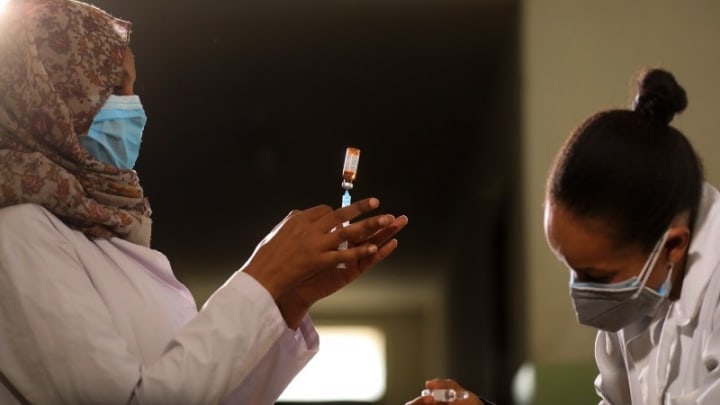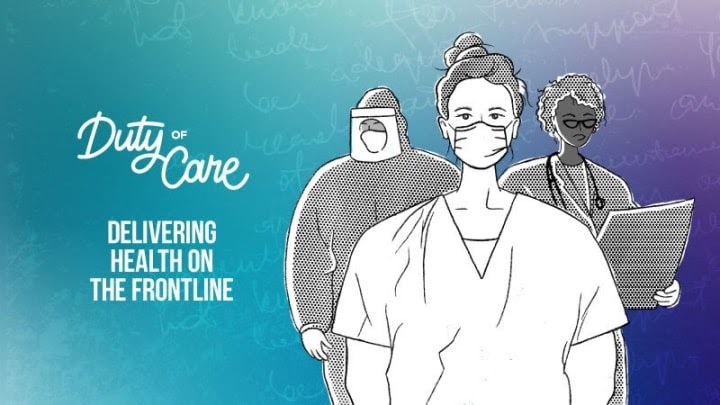
MONTREAL — It didn't take long for medical student Malone Mukwende to realize that the curriculum at St George's, the University of London's medical school, would do little to help diagnose and treat certain conditions on dark skin like his. His course material and textbooks didn’t include much information on how symptoms can differ depending on the skin’s pigmentation, leaving medical staff unable to diagnose certain pathologies on some of their patients.
“It was surprising and shocking to me that we weren't having that information being taught on the range of different skin tones,” Mukwende said.
In his second year of medical training, Mukwende obtained funding from the school to produce “Mind the Gap,” a handbook of clinical signs and symptoms in Black and brown skin, in collaboration with teaching faculty at St George's. The hope is to provide medical staff with practical tools so that they can better serve non-white patients.
Unpacking biases in medicine
Modern medicine inherits a long history of racism, the effects of which can still be felt today. According to a 2016 study, half of medical students and residents in the U.S. hold false beliefs about biological differences between Black and white people. Among those beliefs is that Black people feel less pain and have tougher skin, fallacies that were introduced in the medical system by physicians under slavery.
Conditions that disproportionately affect certain racial and ethnic groups, such as sickle cell disease, have also been shown to receive less funding than those that predominantly affect white people.
“It was surprising and shocking to me that we weren't … being taught on the range of different skin tones.”
— Malone Mukwende, co-author, Mind the GapFor years, advocates have lobbied for more representation of people of color at senior and leadership levels in order to address the needs of a diverse population and increase the quality of care. But progress has been slow. All minority groups remain underrepresented in the United States and United Kingdom health care workforce.
A troubled legacy
Similar dynamics are at play in many low- to middle-income countries.
Suggestions made by two French doctors to test COVID-19 treatments in Africa evoked a long history of racialized groups being used for trials and experiments in the name of science.
The field of global health derives from tropical medicine, which was developed to research and cure ailments that Europeans may encounter while living in the colonies.
Tropical medicine also served as a platform to provide scientific legitimacy to racist theories. Physicians conducted experiments on enslaved people, among them forced surgeries without anesthetics, in order to study presupposed biological differences between racial groups.
Racist policies and experiments continued throughout the 20th century and beyond. Thousands of racialized women, among them Black, Latina, and Native American women in the U.S. have been subjected to forced sterilization. And the first human trials of the birth control pill were conducted in Puerto Rico and Haiti, without the women’s full consent.
Power dynamics
Critics have been calling out global health organizations for upholding inequitable power dynamics between countries, inherited from colonization.
Earlier this year, Global Health 50/50 released a report revealing the vast inequities between high-income countries, where most global health organizations are headquartered, and LMICs.
Only 17% of CEOs and board chairs of global health organizations are nationals of LMICs — that number drops to 5% for female leaders from LMICs. What’s more, 60% of global health leaders hold degrees from universities from U.S. and U.K. universities, with a disproportionate number coming from Harvard.
“White men sitting in high-income countries heading global health institutions think that women in India are still dying mainly of childbirth, but they're actually not.”
— Sumegha Asthana, independent researcher; chair, Women in Global Health IndiaThose inequities affect workers based in LMICs, from front-line workers to NGO officers and university researchers. They reduce avenues for accessing research and program funding, lower opportunities to access decision-making positions, and channel funds away from priorities on the ground, according to Sumegha Asthana, an independent public health researcher and chair of Women in Global Health India, which works to advance gender equality in global health leadership.
“I still feel that when I talk about Indian health systems, my word is not given the same kind of weight as somebody who comes from Harvard or Oxford and wants to tell us about the health systems in India,” Asthana told Devex.
She said global health funding disbursed to India has failed to adequately match the burden of disease, with diseases such as tuberculosis and diarrhea being underfunded as compared to others like HIV. What’s more, little of it has gone to strengthening India’s health system, and to the local organizations working on the front lines.
“White men sitting in high-income countries heading global health institutions think that women in India are still dying mainly of childbirth, but they're actually not. We're also dying of mental health diseases, we're dying of cancers, we're dying of cardiovascular diseases,” Asthana said.
She said those discrepancies are in large part due to the lack of representation of front-line workers in decision-making.
Supporting global health workers in LMICs
Across the globe, women represent 70% of the global health workforce, but only occupy 25% of leading roles, according to a literature review conducted by the Gender Equity Hub, which is co-chaired by the World Health Organization and Women in Global Health. Despite delivering critical services to the population, women health workers, among them nurses, midwives, and community health workers, remain vastly underpaid and discriminated against.
“It’s totally surprising that these women are not involved in charting our health practices, in making our health plans for our country as well as globally,” Asthana said.
More from Duty of Care:
► From heroes to villains: Health care workers targeted in coronavirus-related attacks
Renzo Guinto, a Filipino physician and public health expert, has been grappling with the imbalances at play in the global health sector on a personal level. Upon completing his doctoral studies at Harvard, he decided to go home and work in the Philippines, where he thought his work could be more impactful.
“I felt a deep sense of obligation to give back and pay forward, and to utilize what I learned from abroad to make the situation a bit better in my country,” he said.
Guinto estimates that his current salary in the Philippines is 50 times smaller than if he had remained in the U.S. or another high-income country. When contracted by foreign global health organizations as a consultant, he is considered a local hire and paid less than consultants based in high-income countries.
He worries that over time, being based in the Philippines will prevent him from accessing the networks where high-level decisions are being made.
“My beliefs are constantly being challenged and interrogated,” he explained. “Sometimes I think, ‘Am I actually doing the right thing?’ Or am I closing a lot of doors because of my insistence and my devotion to these values and ideals?”
Asthana and Guinto are among a growing number of global health professionals who are calling to “decolonize” the sector and address the systemic biases that prevent health workers in LMICs from having a say in the policies and programs that impact them.
But the solution should come from both sides, they said. While HICs should provide more educational and work opportunities to global health professionals who wish to remain in the global south, governments in LMICs should also work to reduce their dependence on foreign expertise, and develop a strong pool of local talent.
“National institutions have been systematically weakened to create space for transferring knowledge from abroad,” Asthana said.
Right now, too few LMICs can actually train public health experts locally and offer competitive career opportunities to graduates who have been educated abroad.
“Countries in the global south also have a responsibility to prepare their next generation of global health leaders, especially in the age of COVID-19 and beyond,” Guinto said.
Visit the Duty of Care series for more coverage on how health systems can function better so that health care workers are supported and protected. You can join the conversation using the hashtag #DutyOfCare.





